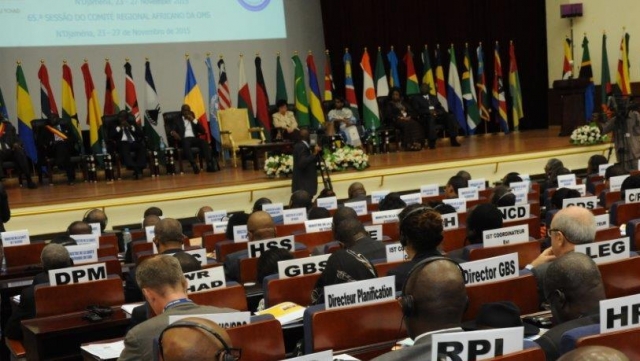WHO Regional Committee for Africa gets underway in N’Djamena, Chad
 N’Djamena, 23 November 2015 – Chadian President Idriss Deby Itno has called on African countries to demonstrate more active solidarity to provide appropriate responses to the many health challenges facing the Region.
N’Djamena, 23 November 2015 – Chadian President Idriss Deby Itno has called on African countries to demonstrate more active solidarity to provide appropriate responses to the many health challenges facing the Region.
In a speech read on his behalf by Prime Minister of the Republic of Chad, His Excellency Kalzeube Payimi Deubet, at the opening ceremony of the 65th Session of the WHO Regional Committee taking place in N’Djamena, he noted that the global financial crisis that hit international institutions, including WHO, requires all members states in the region to honor their obligations. The Prime Minister used the opportunity to announce "Chad's willingness to honor all firm commitments with respect to special funds and participation in statutory contributions of the Organization".
He mentioned some major initiatives introduced by His Excellency the President of the Republic Chad to improve the health status of the Chadian people. These include strengthening the health care delivery through the provision of adequate health facilities throughout the country; training and motivation of health workers; and improving accessibility for all to health care and medicines.
He reminded the delegates that the people of Africa expect a lot from the current session of the WHO Regional Committee. “I urge all delegates to discuss with a lot of objectivity, rigor and relevance as you examine issues brought to your attention so that the resolutions and recommendations of your work really benefit our countries, " he concluded.
In her remarks, the WHO Director-General, Dr Margaret Chan commended Member States for the progress made towards polio eradication in the Region. Since the past year, no child in the Region has been paralysed by the wild polio virus. She however cautioned that this triumph over the disease is not secure and stressed the importance of maintaining high immunization coverage and intense surveillance.
Referring to the Ebola virus disease outbreak, the Director-General noted that the disease put a spotlight on some of the worst things that can happen when health systems and infrastructure are weak or broken. She urged countries in the Region to partake in opportunities offered by ongoing initiatives to develop International Health Regulations (IHR) capacities, improve surveillance and strengthen laboratory capacities.
The WHO Regional Director for Africa, Dr Matshidiso Moeti, told the delegates that the Ebola epidemic is almost at its end. She said many lessons have been learnt in the response to the epidemic including the need for strong and functional health systems for timely detection and notification and for a quick and effective response to prevent further spread of the diseases. She also stressed the importance of community leadership, ownership and engagement. “Improved global mechanism for rapid response to major epidemics through effective global coordination is critical for any public health event of international concern,” she emphasized.
Dr Moeti reminded delegates that as countries work towards the Sustainable Development Goals, there is the need to address the social and environmental determinants as well as to explicitly focus on equity. “This will require broad collaboration among different actors in countries - government, civil society, international development partners, the private sector and philanthropy,” she said.
In a report on the work of WHO in the Region during the past biennium, the Regional Director indicated that the pace of introduction of new vaccines has been sustained. All countries in the Region have introduced vaccines against hepatitis B and haemophilus influenza Type B in all 47 member countries. Thirty five countries introduced the Pneumococcal Conjugate Vaccine while 26 introduced the rotavirus vaccine in their routine EPI programs. To minimize the risk of meningitis epidemics, more than 64 million people were vaccinated against type A meningococcal meningitis between December 2014 and September 2015.
There was a 56% decline in the number of AIDS-related deaths between 2005 and 2014. In 2014, 22 countries in the Region recorded declines of more than 50% in AIDS related deaths, compared to 2005. An additional 1.7 million people living with HIV were initiated on antiretroviral therapy in 2014, bringing the total number of persons on ART in the Region to over 10 million.
Dr Moeti stated that since she assumed office last year, she has embarked on an ambitious program to transform the WHO Secretariat in the African region into an effective, responsive accountable and results driven organization.
The Regional Committee, WHO's Governing Body in the African Region, is made up of Health Ministers from the 47 countries which constitute the African Region of WHO. Its principal brief is to review WHO's work in the Region and provide guidance on suggested actions to improve the health situation in Member States. Ministers of Finance from some Member States are also attending the meeting.
______________________________________
Regional Committee contacts:
Dr Joseph Cabore, Director of Programme Management; Tel: +47 24139342; Email: caborej [at] who.int (caborej[at]who[dot]int)
Collins Boakye-Agyemang, Regional Communications Adviser; Tel: + 242 06 520 6565; Email: boakyeagyemangc [at] who.int (boakyeagyemangc[at]who[dot]int)
Joana Teixeira, Communications officer, Email: Teixeiram [at] who.int (Teixeiram[at]who[dot]int)
Jonas Naissem, Communications Officer in Chad; Tel: +235 52 3805; Email: naissemj [at] who.int (naissemj[at]who[dot]int)


